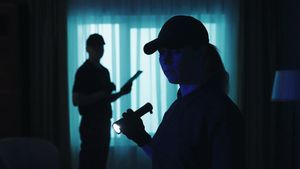Reimagining a beloved film for the stage can be a challenge -- there's the desire to avoid simply producing a copy, but also the need to avoid alienating fans of the original. But Christopher Wheeldon, the director and choreographer of the stage adaptation of An American in Paris, believes he and his team have made a version that the creators of the 1951 film would have made if they could.
"We were excited about being able to place the story in a more truthful historical context," Wheeldon says of the adaptation, which addresses issues such as the plight of Jews during World War II and the situation of gay and bisexual people in a homophobic world. He thinks those involved with the original, including star and choreographer Gene Kelly and director Vincente Minnelli, might have done something similar if they were free of their era's constraints.
Now a wide audience will have a chance to see and judge Wheeldon's version for themselves. A performance from its London run has been committed to film and will screen in theaters throughout the U.S. and Canada today and Sunday.
The show opened, appropriately enough, in Paris in 2014, then went on to a successful Broadway run in 2015-16, winning four Tony Awards, including one for Wheeldon's choreography. The London production followed, as did a U.S. tour. The Broadway leads, Robert Fairchild and Leanne Cope, starred in the London iteration as well and are seen in the film.
This version, with a book by Craig Lucas (Longtime Companion, Prelude to a Kiss), definitely differs from the 1951 film, which won six Oscars,including Best Picture in addition to Best Story and Screenplay (by Alan Jay Lerner). But the essential story is the same: Jerry Mulligan, an American ex-GI turned struggling painter in post-WWII Paris, falls hard for a beguiling young Frenchwoman named Lise. She returns his affection - but she feels obligated to wed Henri, the wealthy Parisian who sheltered her during the war. Meanwhile, Jerry attracts the attention and patronage of an American heiress, Milo, who isn't inclined to let him go without a fight.
But the Wheeldon-Lucas version sets the action in 1945, immediately after the war's end, instead of a few years later, so the wounds of the war and the Nazi occupation of France are still raw. "So many human connections are made in times of strife," Wheeldon says. While in the film, Lise needed Henri's protection because her parents were in the French Resistance, in the play it's made clear she was in danger because she's Jewish. And although Henri says he truly loves Lise, he may not be in love with her -- there's a strong implication that his romantic interests lie beyond the fairer sex, as other characters in the show put it.
"I worked closely with Craig on the book, but all these innovations came from his ideas," says Wheeldon, who is gay himself, as is Lucas. "I was excited that Craig wanted to push the envelope a bit." Some ambiguity surrounds Henri's sexuality, Wheeldon notes; the character might have found happiness either with Lise or with a chorus boy in America, where he plans to tour as a cabaret singer. "It makes Henri a very complex and interesting character," he says. "I was all for it from the beginning."
 Haydn Oakley as Henri
Haydn Oakley as Henri
Also, without being anachronistic, the play avoids some of the original film's sexism, excising snide comments about Jerry being unmanned by taking money from a woman, and making Lise a stronger, more fleshed-out character with career aspirations of her own. "I think it's important that you reflect the ideas of today but you're being respectful of the period," Wheeldon says.
Lise's aspiration is to be a ballet dancer, which works well because the play, much like the movie, is driven by dance and by the glorious music of George and Ira Gershwin. Most of the 1920s and '30s Broadway shows that featured the Gershwins' music have such thin and dated books that they're pretty much unrevivable. (An exception is the folk opera Porgy and Bess, although a 2012 Broadway revival included revisions to address racial stereotyping -- the characters are all African-American -- and other issues.) But generations of musicians have assured that George's soaring melodies and Ira's smart, witty lyrics remain in the public eye and ear, while the 1951 film could be considered an early example of the jukebox musical.
Wheeldon's version uses some of the same songs as the movie and some others; fans can count on hearing such standards as "S'Wonderful," "I Got Rhythm," "I'll Build a Stairway to Paradise," and many more, including the instrumental title suite -- and yes, there's a ballet danced to it, just in a slightly different context than in the film.
Although he had some experience in choreographing musical theater before An American in Paris, Wheeldon had never directed in that form. He comes from the ballet world, as do Fairchild and Cope, both of whom had danced for him in that realm. The dances choreographed by Wheeldon for the show are definitely ballet-influenced, and they're breathtaking, as are the dancers. Asked about making ballet accessible to a broad audience, Wheeldon responds, "I always think of ballet as being accessible." But some people decide it's not accessible without giving it a chance, he says. An American in Paris, he adds, gave him a chance to show doubters that ballet can be romantic and sexy, while saying something about the human condition.
For Fairchild, who plays Jerry, it was both a thrill and a challenge to follow in the redoubtable footsteps of Gene Kelly. "Gene Kelly is like my idol," he says. "I love the film." He set out, however, to do his own version of the character, which is what he believes Kelly would have advised. "You can't duplicate Gene Kelly," he says. "I just got such a thrill in being able to dance in the shadow of my idol."
Cope, cast as Lise, likewise has great esteem for Leslie Caron, who played the role in the original movie. Cope watched it shortly after she auditioned for the show and fell in love with it, she notes. "I was completely mesmerized by Leslie Caron," she says. "I couldn't imagine anyone else creating that magic."
It's clear from seeing the film of their performance, though, that Fairchild and Cope have created magic too -- as have the many other gifted players, including Haydn Oakley as Henri, Zoe Rainey as Milo, and David Seadon-Young as Adam, Jerry's sardonic, vulnerable composer friend.
Wheeldon says the show was a wonderful collaborative experience, and it was gratifying to see Fairchild and Cope transfer their skills to musical theater and develop new ones, as he was doing the same. "We were all venturing into the unknown," he says. "Knowing we were all doing it together gave us a little bit of peace of mind."
"The film kind of captures them at the height of their skills," he adds. "In the film they come across as incredibly skilled actors as well as wonderful dancers." Fairchild and Cope have nothing but praise for Wheeldon as well, and for the innovations Lucas brought to the book, adding Lise's Jewish identity and the inferences about Henri's sexuality, and moving the action to immediately after the war. "There's something to be said about artists living in difficult times," says Fairchild, noting that this remains relevant today.
While there's nothing quite like the experience of seeing a musical onstage, he notes, seeing the performance filmed affords a different level of intimacy. "One of the things the camera can do that the naked eye can't is zoom in," Wheeldon says. Cope adds that even those who've seen the show onstage will get something new out of seeing the filmed performance. "You really do see things you haven't seen before," she says.
The screenings are yet another step in Wheeldon's journey with An American in Paris, but not his last one. He's preparing a version that will open in Japan next year; that nation will also see a production of a Wheeldon ballet, Alice's Adventures in Wonderland. On top of all that, he's developing a new musical in New York.
Of An American in Paris, he adds, "It was a wonderful, wonderful experience, and it just keeps going."
Click here to find a screening at a theater near you, and watch the trailer below.
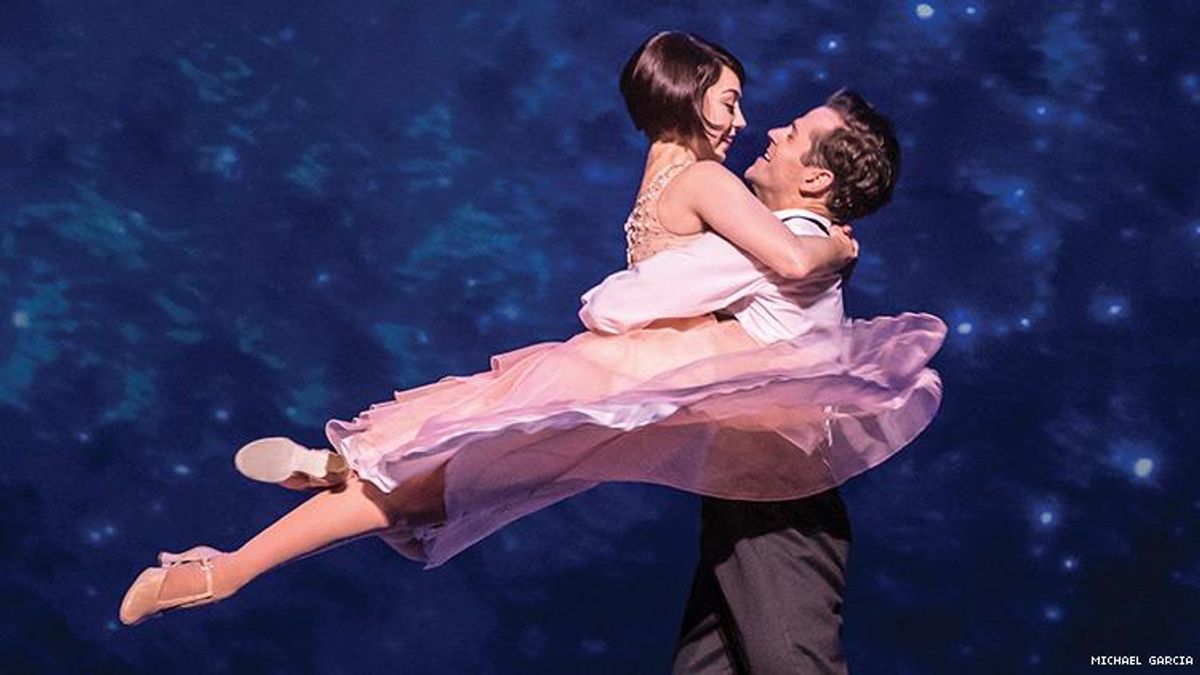






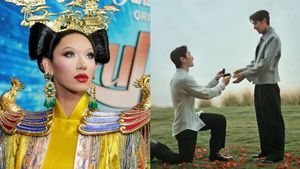

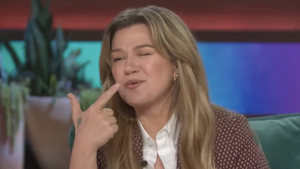



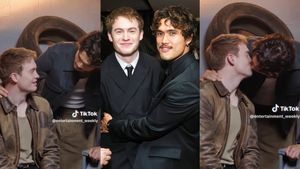


















 Haydn Oakley as Henri
Haydn Oakley as Henri
















